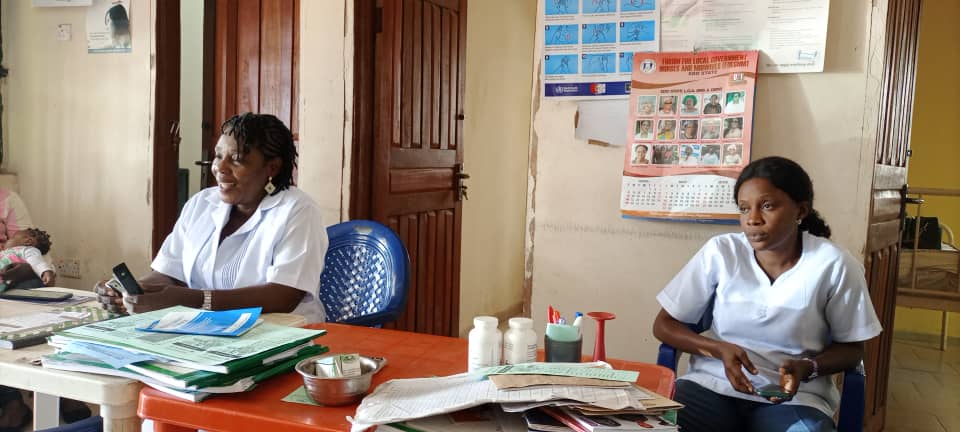Health
Economic Hardship: There Is Need For More Family Planning – Expert
Published
3 years agoon
By
Editor
By Joseph Kanjo, Benin
The need for more family planning in the society has once again been emphasised particularly in this period when the Nigerian society and by extension the world is faced with economic hardship.
Mrs. Omorere Adesuwa, Chief Nursing Officer and Officer in Charge, Oko Primary Health Care Centre in Oredo Local Government Area of Edo State made this assertion, Thursday, when members of Media Advocacy Group, Benin, paid a visit to the facility.
The Chief Nursing Officer who welcomed the Group warmly at the instance of Challenge Initiative, TCI, said people have been coming to the centre for family planning and life planning, adding “We chant the need for family planning when mothers come for post-natal care.We sing child spacing even when husbands come with their wives. “
READ ALSO: ‘We’re In Nigeria To Meet With Potential Students Willing To Study In UK’ – Aston University
On the sexually active youths, Nurse Omorere said they do advise them to abstain from sexual intercourse whenever they have the opportunity to interface with them, adding that when they insist or cannot do without sex they advised them to go for any of the various life planning suitable for them.
She said the category of youth so active in sex in the in the state falls between age bracket of 15 and 24 years.
“For the sexually active youths, we sensitise them on abstinence, but when they insist, we counsel them on the available life planning methods – injectable, oral pills, implants, etc. The use of condoms by these youths is regular because of its dual purpose as a planning method as well as its effective role in prevention of Sexuallh Transmitted Disease, STDs,” she said.
READ ALSO: Lawyers Eulogise Retired Edo CJ, Give Award In Her Honour
Speaking on whether these youths are willing to dish out the sexual life with a third party, Mrs. Omorere said, “Confidentiality is key. If these young adolescents know they could confide in you, they will take your advocacy calmly. Yes, they may get pregnant, but it is our duty to make them understand that pregnancy is not the end of the road for them in planning their future. We counsel them, often times get across to their families and guide them on the actions that will be helpful in actualising their potentials and attaining the future of their dream,” she said.
The Chief Nursing Officer of the facility who bemoaned the effect of poverty on the rate of sexual activity among youths and adolescents, also cautioned on the use of abortion as a life planning method.
“Poverty and the crave for modern communication gadgets and others are culprits in the rate of sexual activity among youths. We all have a role to play in mitigating this development.
READ ALSO: Edo PDP Crisis: Local Government Chairman, Secretary Suspended
“Abortion is not yet legalised in our country, as such, we do not encourage it here. Abortion is risky, it is a blind procedure, and it could become septic if not properly done.
“While we don’t procure abortion here, we however administer Post Abortion Care (PAC) when we get the referrals,” she added.
She emphasised the need for training and retraining of hearth care personnel, noting that it is the key to good service delivery.
She noted that the outward disposition of help personnel could make the services poor, stressing that training and retraining are vital in service delivery.
READ ALSO: Confusion As Police Deny Killing Four Fleeing Wounded Gunmen, Nurse Offering Treatment In Rivers
You may like


Edo 2024: Imansuangbon Promises To Revive Sports Using Ogbemudia’s Template


World Tourism Day 2023: Edo To Rally Stakeholders On Heritage Promotion, Protection Policy To Drive Sector Growth


JUST IN: Edo APC Vice Chairman, Seven Others Expelled From Party


APC Blames PDP For Impoverishing 133m Nigerians


Man Arrested For Transporting 250 Parcels Of Indian Hemp From Edo To Kano


Nurse Performs Surgery On Edo Bizwoman, Victim Dies

By Silver Yeibake
Autism, commonly known as Autism Spectrum Disorder (ASD), is a neurodevelopmental disorder that affects communication, social interaction, and behavior. Autism is referred to as a spectrum condition since it can manifest in a variety of symptoms and abilities. While the actual cause of autism is unknown, evidence suggests that genetic and environmental factors interact to influence its development.
The risk factors include a sibling with autism, advanced age of parents, exposure to certain air pollutants and pesticides before birth, extreme prematurity, mothers with diabetes, immune system disorders or obesity, any difficulty with delivery leading to deprivation of oxygen to the baby’s brain, fever during pregnancy, lack of certain vitamins minerals during pregnancy, and certain genetic conditions, such as Down, fragile X, and Rett syndromes.
“Risk factors can not on their own cause a disease. However, they can increase the likelihood of that disease in a person.”
It is important to know that contrary to trending claims online, there is no scientific or medical evidence that vaccines or consumption of sugar are risk factors for autism.
READ ALSO: Kidney Stones: What You Need To Know
Autism is defined by difficulties in social interaction and communication. Individuals with autism may struggle to grasp social cues, maintain eye contact, and engage in typical back-and-forth conversations. Some people may also engage in meaningless, repetitive actions, such as hand-flapping or rocking, and have strong interests in specific areas.
It is essential to remember that autism is a lifelong diagnosis, but with early intervention and adequate care, people with autism can live fulfilling lives.
Autism treatment frequently includes behavioral therapy, speech therapy, occupational therapy, and social skills training. Each individual with autism is unique, thus interventions should be tailored to meet their personal needs and strengths.
In spite of the difficulties that autism can cause, many people with autism possess unique talents and abilities. Some people may succeed in fields such as music, art, mathematics, or programming, thus it is important for society to acknowledge and honor the qualities and achievements of people with autism.
In summary, autism is a complicated and diverse disorder that affects individuals in various ways. By raising autism knowledge, understanding, and acceptance, we can build a more inclusive society in which people with autism can thrive and attain their full potential.
Dr. Yeibake, Weriwoyingipre Silver.
Senior Registrar,
Faculty Of Pediatrics,
WACP
Health
Don Confirms ‘Zobo’ As Antihypertensive Therapy
Published
2 months agoon
March 10, 2024By
Editor
The Deputy Vice Chancellor, University of Nigeria Enugu Campus, UNEC, Prof. Daniel Nwachukwu, after research findings and clinical trials in both animals and human, has confirmed that Hibiscus Sabdariffa, popularly called ‘zobo’ drinks, has all the curative potentials as an antihypertensive therapy.
Nwachukwu, who is a Professor of Cardiovascular Physiology in the university, stated that the antihypertensive effectiveness of the Hibiscus Sabdariffa (zobo) was comparable to those of known antihypertensive drugs that are popular in the retail pharmacies, adding that zobo’s availability, cheapness and absence of side effects make it attractive as an alternative therapeutic agent in mind to moderate hypertensive subjects.
He however cautioned that care should be applied to avoid abuse in the consumption of Hibiscus Sabdariffa (zobo), adding that the therapy could interfere with some anti-malaria drugs while its high dose was also reported to have toxic effects on the liver and kidney.
READ ALSO: How Airline Pilots Fell Asleep Mid-flight – Safety Agency Reveals
Nwachukwu’s discoveries were contained his 201st Inaugural Lecture of the University of Nigeria with the topic “The Marriage Between the Cardiovascular System and Hibiscus Sabariffa: Let no One Put Asunder,” delivered at the moot court hall, Law faculty of the University of Nigeria, Enugu campus.
The DVC warned that Hibiscus Sabariffa consumption is not recommended for persons with low blood pressure because of its well established hypotensive action, advising that during combined therapy with antihypertensive drugs, the blood pressure, BP, must be carefully monitored.
He recommended that industrialists and investors should support large scale production of Hibiscus Sabariffa beverage and its distribution to rural communities in Nigeria, particularly since the raw materials (Hibiscus Sabariffa calyx and water) are cheap and readily available.
READ ALSO: Man Stabs Two Women To Death At A Mexico Varsity
According to Nwachukwu, “This lecture is intended to draw the public attention to our research efforts and unveiling the antihypertensive ability of Hibiscus Sabariffa which is called zobo in our common parlance. What we used for our studies was the same concentration as the locally produced zobo, and we found out that it exerted significant antihypertensive ability, in some cases even higher than the antihypertensive drugs and also did combination therapy with other antihypertensive drugs.
“What is significant is that this zobo is within us, it’s very cheap and it does not have any side effects compared to other antihypertensive agents. The raw material is just to buy zobo, prepare it under hygienic conditions, boil water and put it, sieve it and drink. It may have a sour taste but we do not encourage people to add things like pineapple or sugar in order to make it sweet, because once you do that, you are diluting or reducing its antihypertensive effectiveness.
“We have demonstrated it, both in animal studies and in humans. We are the first to do clinical trials, using mild to moderate antihypertensive Nigerians and we found it very useful. Some of the results show that one can actually use it and we equally saw that you can use it to prevent even diabetes from occurring because it reduces the rise in glucose level.”
READ ALSO: Adolescent Girls Face Risks Of Sexual Violence – UNICEF
Vice Chancellor of the University, Professor Charles Igwe while summarizing the lecture said that the lecture was in three dimensions; one on health grounds, another in academics and the third an economic value.
“Its economic in the sense that we can also begin to use what God has given us to make money. Maybe because God gave us everything in abundance in this country, we don’t recognize the simplest things God gave us in our environment. Therefore, what we are saying is that we should begin to, at all these pure water productions and incorporate zobo production so as to make money out of it.
“The university has made its contribution through our laboratories and it’s now left for the business community and the industries to come and buy into it and start widening it and make it very economic,” Igwe suggested.
Vanguard

By Silver Yeibake
Hi, did you know that Tuesday 12th March, 2024 is world Glaucoma day?Kindly avail yourself of this opportunity to learn about this important health issue as presented below:
Glaucoma is a dangerous eye disorder that damages the optic nerve, causing visual impairment or permanent blindness if not treated.
The optic nerve transmits visual information from the eye to the brain. Damage to this nerve might cause gradual visual loss that is not immediately obvious.
Worldwide, this disease affects 67 million people and contributes 6.7 million of blindness in this population. Glaucoma is the leading cause of blindness in the world.
The total number of cases is expected to increase to 111 million by 2040. Males are slightly more affected than females.
One of the basic causes of glaucoma is an increase in intraocular pressure (pressure within the eyeball), which can eventually damage the optic nerve (the nerve that makes seeing possible). This increase in pressure could be caused by an accumulation of aqueous humor, the fluid that nourishes the eye.
FROM THE AUTHOR: Food Poisoning: What You Need To Know
There are several forms of glaucoma, including open-angle glaucoma, angle-closure glaucoma, normal-tension glaucoma, and secondary glaucoma, each with unique characteristics and treatment choices.
Some of the risk factors for glaucoma include sustained elevation of intraocular pressure, family history of glaucoma, race (African, Asian), short-sightedness, long-sightedness, age over 50, previous eye injury or surgery, hypertension, diabetes mellitus, migraines, and prolonged steroid therapy.
Glaucoma symptoms may not appear until the problem has advanced sufficiently, therefore regular eye checks are essential for early detection. Blurred vision, eye pain, nausea, and light halos are some of the most frequent glaucoma symptoms. However, these symptoms might be mild or readily misinterpreted as other eye problems, emphasizing the significance of regular eye examinations.
Glaucoma treatment tries to reduce intraocular pressure and protect the optic nerve from further damage. This can be accomplished using a variety of approaches, including prescription eye drops, oral medicines, laser therapy, and surgical procedures. Treatment options are determined on the kind and severity of glaucoma, as well as personal characteristics such as overall health and medical history.
To summarize, glaucoma is a serious eye disorder that requires timely diagnosis and treatment to prevent irreversible vision loss. Regular eye examinations, early detection, and commitment to treatment plans are critical for protecting vision and eye health in glaucoma patients.
Thank you.
Dr. Yeibake, Weriwoyingipre Silver, a
Senior Registrar, Faculty Of Pediatrics, West Africa College of Physician (WACP), writes from Yenagoa, Bayelsa State.

LIST: 25 Countries Where TikTok Is Banned

Court Frees Monarch, 42 Others Over Rivers DPO’s Murder

JUST IN: Nollywood Veteran Actor, Ogunjimi Is Dead
Trending

 Entertainment4 days ago
Entertainment4 days agoBridesmaids’ Dance At Wedding Causes Stir On Social Media [VIDEO/PHOTOS]

 Metro4 days ago
Metro4 days agoVIDEO: ‘UNN Lecturer’ Caught Pants Down With Married Student

 News2 days ago
News2 days agoDrama! Supporters Of Yahaya Bello Perform Rituals to Prevent His Arrest By EFCC [Video]

 News2 days ago
News2 days agoVIDEO: Force PRO Orders Arrest Officers Caught On Video Bashing Driver’s Car

 Headline3 days ago
Headline3 days agoDrama As Women Fight Dirty, Breasts Fall Out During Spring Break Outing In US [PHOTOS/VIDEO]

 Entertainment2 days ago
Entertainment2 days agoNollywood Actor, Zulu Adigwe Is Dead

 Metro2 days ago
Metro2 days agoEdo Cultists Kill Rival In Daughter’s Presence, Abandon Getaway Car

 Headline3 days ago
Headline3 days agoMeet 17-year-old Nigerian Who Won $3.5m Worth Of Scholarships From Harvard, 13 Other Foreign Universities

 News4 days ago
News4 days agoIGP, Jonathan Disagree Over State Police

 News5 days ago
News5 days agoOutrage As Chinese Supermarket In Abuja Denies Nigerians Entry
































